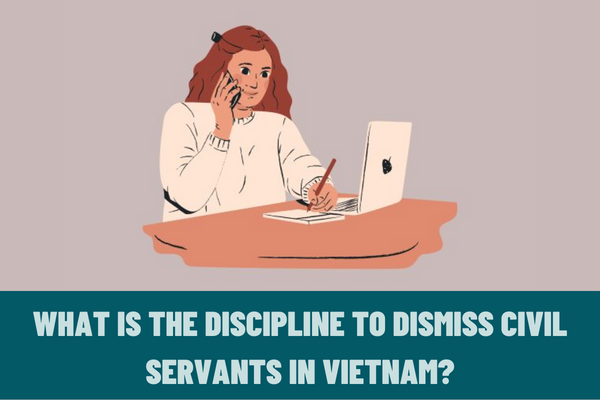What is the discipline to dismiss civil servants in Vietnam? What are the cases in which cadres and civil servants in Vietnam are dismissed according to current regulations?
What is the discipline to dismiss civil servants in Vietnam?
Pursuant to Clause 9, Article 7 of the 2008 Law on Cadres and Civil Servants in Vietnam, the definition of dismiss is as follows:
Dismiss means to disallow a cadre or civil servant to hold a leading or managerial post before the end of the term of office or appointment.
According to that, it can be understood that dismissal of civil servants means that civil servants who are holding leading or managerial post are not allowed to continue holding positions before the end of their term of office or appointment.
What are the cases in which cadres and civil servants in Vietnam are dismissed according to current regulations?
Pursuant to Article 12 of Decree No. 112/2020/ND-CP as follows:
Applying the discipline of dismissal of cadres and civil servants holding leading or managerial post
Disciplinary dismissal shall apply to cadres and civil servants holding leading or managerial posts in one of the following cases:
1. Civil servants holding leading or managerial posts have been disciplined by demotion as prescribed in Article 11 of this Decree but recidivism or cadres have been disciplined in the form of warning according to the provisions of Article 9 of this Decree but recidivism;
2. Committing an act of violation for the first time, causing very serious consequences in one of the cases specified in Clause 3, Article 9 of this Decree;
3. Having committed a violation for the first time, causing particularly serious consequences in one of the cases specified in Article 8 of this Decree but not yet reaching the point of forced dismissal, violators have an attitude of absorbing, correcting, taking the initiative in overcoming consequences and having many extenuating circumstances;
4. Using illegal documents to be elected, approved, appointed to a position.
Thus, civil servants will be subject to the discipline of dismissal when falling into one of the above cases.

What is the discipline to dismiss civil servants in Vietnam? What are the cases in which cadres and civil servants in Vietnam are dismissed according to current regulations?
What are the current principles of disciplining civil servants in Vietnam?
Pursuant to Article 2 of Decree No. 112/2020/ND-CP stipulating the principles of disciplining as follows:
Principles of disciplining
1. Be objective, fair; public, transparent; strict, lawful.
2. Each violation will only be handled once by a form of discipline. At the same time of disciplinary consideration, if cadres, civil servants and public employees commit 02 or more violations, they shall be disciplined for each violation and apply a discipline heavier than one level of discipline applied to the most serious violation, except for the case of being disciplined in the form of dismissal or forced dismissal; failing to separate each violation content of cadres, civil servants and public employees in order to be disciplined many times with different forms of discipline.
3. In case a cadre, civil servant or public employee who is in the process of executing a disciplinary decision continues to commit violations, the following disciplinary forms shall be applied:
a) If any violation is disciplined in a form lighter or equal to that of the current discipline, a more severe disciplinary form than the currently being disciplined form shall be applied;
b) If there is a violation that is disciplined in a more severe form than the currently being disciplined form, then apply a disciplinary form one level heavier than the discipline applied to the new violation.
4. When considering disciplinary action, it must be based on the content, nature, extent, harm, cause of the violation, aggravating or mitigating circumstances, the attitude of receiving and correcting, the overcoming of defects, violations and consequences caused.
5. Failing to apply administrative sanctions or communist party discipline in place of administrative discipline; Administrative discipline is not a substitute for criminal prosecution, if the violation is serious enough to be criminally handled.
6. Where cadres, civil servants and public employees have been disciplined by the Communist party, the form of administrative discipline must be ensured at a level commensurate with the Communist party discipline.
Within 30 days from the date of publication of the decision to discipline the communist party, agencies, organizations and units must consider and decide on administrative disciplinary handling.
7. All acts of infringing upon body, spirit, honor and dignity are strictly prohibited during the disciplinary process.
8. Cadres, civil servants and public employees who commit violations for the first time and have been disciplined but within 24 months from the effective date of the disciplinary sanctioning decisions have the same violations, they shall be considered a recidivism; beyond the time limit of 24 months, such violation is considered a first violation but is counted as an aggravating circumstance when considering disciplinary action.
Thus, at present, the discipline of civil servants is carried out according to the above 08 principles.
In particular, when disciplining civil servants, they must ensure the performance is objective, fair; public, transparent; strict, lawful.
When considering disciplinary action, it must be based on the content, nature, extent, harm, cause of the violation, aggravating or mitigating circumstances, the attitude of receiving and correcting, the overcoming of defects, violations and consequences caused.
LawNet